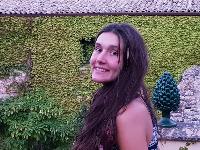Bertrande Galfré

Domaines de recherche
Parcours universitaire et professionnel
Cette thèse porte sur l'agriculture biodynamique dans la région du Comminges (Haute-Garonne, Gers, Ariège, Hautes-Pyrénées), riche d’une grande diversité d’acteurs la pratiquant : hétérogénéité des échelles (du jardin vivrier à la ferme collective certifiée), des parcours biographiques, des âges et des professions (paysan-boulanger, maraîcher, éleveur etc.). Les données ethnographiques de ce travail de recherche sont issues d’une enquête de terrain de 16 mois : quatre mois en 2017 et une année en continue, de septembre 2019 à septembre 2020.
A la fois agriculture et spiritualité alternative, la Biodynamie propose un chemin attrayant à celles et ceux qui, néo-ruraux.ales et agriculteur.rice.s natif.ve.s, posent de concert les questions de leur évolution personnelle et celle de leur société. En reprenant des catégories de la sociologie religieuse devenues classiques nous voulons montrer ici, à partir de l’exemple ethnographique du Comminges dans les Pyrénées, que les paysans et paysannes qui s’engagent en agriculture biodynamique se lancent dans un processus de transformation du soi tenant à la fois tant du « converti » que du « pèlerin » (Hervieu-Léger 1999). Par ailleurs, dans une approche pragmatiste du fait spirituel, nous voulons défendre l’idée ici que la Biodynamie se caractérise par une ritualisation des pratiques agricoles et que, dans cette perspective, sa priorité en tant que méthode est d’instruire une voie pour se mettre en relation avec le « vivant ». Nous nous servons pour cela de l’anthropologie rituelle dans son approche relationnelle, par laquelle Michael Houseman nous invite à « […] appréhender les actions rituelles comme des mises en forme et en acte d’un réseau de relations, à la fois entre les participants et avec des entités non humaines (esprits, ancêtres, objets, images, paroles, lieux, etc.). » (2012 : 15). Dans cette perspective, l’efficacité de cette agriculture ne se circonscrit plus uniquement à ses résultats quantifiables, par exemple au calcul de ses rendements, mais relève plutôt d’une efficacité rituelle que l’on peut qualifier de relationnelle (Houseman & Severi, 1996). Autrement dit, elle se mesure alors à la qualité ressentie des formes relationnelles qui émergent et se déploient avec les autres formes de vie, visibles et invisibles.
Cette thèse se propose d'explorer les changements relationnels qu'impliquent ces chemins de conversions agroécologiques et spirituels. Ainsi, la conversion à la Biodynamie peut se lire comme un processus fortement ritualisé qui suppose une reconfiguration des attachements au monde et notamment au vivant. A travers leurs parcours biographiques, ces paysan.e.s commingeois nous montrent qu’en se convertissant à la Biodynamie, ils et elles choisissent de transiter d’un régime d’attachement à un autre (Latour, 2000).
Terrains
France
- Sep. 2019 (53 semaines)
Douze mois de terrain ethnographiques dans une diversité de fermes biodynamiques commingeoises. Traverser le cycle complet des saisons pour s'immerger dans les rythmes primordiaux de cette agriculture alternative ritualisée, en partageant le quotidien des paysan.es grâce au wwoofing et aux stages en tant qu'ouvrière agricole.
lien vers l'article
Représentante des doctorant.e.s du LESC 2024.
Tutrice pour le mémoire de master d’Antoine Rignault, étudiant du Master en Sciences humaines et sociales mention anthropologie et parcours APE de l’Université Paris-Nanterre. Intitulé : La personnalité des vin, des sols au verre. Nature, analogie et biodynamie sur une appellation grand cru alsacienne et dirigé par Eric Garine Wichatitsky (LESC-CNRS).
Représentante adjointe des doctorant.e.s du LESC 2019.
Janvier à Avril 2024: Chargée de cours vacataire à l’Université Toulouse Jean-Jaurès. 48h TD : « Anthropologie et ses mondes » et « Accompagnement Méthodologique: l’entretien ethnographique ».
Relationships between humans and non-human entities are at the heart of Biodynamic Agriculture, founded by Rudolf Steiner and inspired by the esoteric current he created, Anthroposophy. Biodynamic Agriculture’s spiritual origins have practical consequences. It is not about improving the productivity of the farm but is rather an agriculture of care, aiming to reach a symbiotic welfare for the individual and his environment through a process of ritualization of practices. This chapter, based on the ethnography of a peasant network involved in Biodynamic Agriculture living in Southwestern France (Occitanie), shows how ritual anthropology in its relational approach framed by Michael Houseman and Carlo Severi can give a special enlightenment to this peasant practice that is intertwined between agriculture and spirituality. Analysing the analogical way of thinking in order to understand the ontological recomposition that Biodynamic Agriculture proposes, this practice can be seen as an everyday life rituality through an anthropology of gestures. Biodynamicists develop gestures as techniques to understand and relate to the "Living", as much as for self-development.